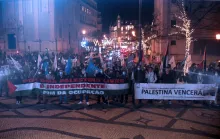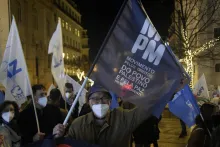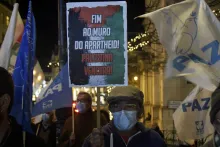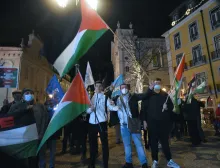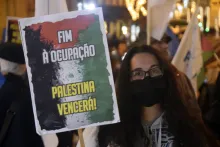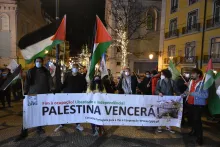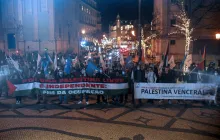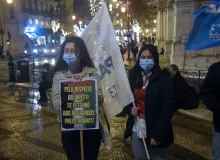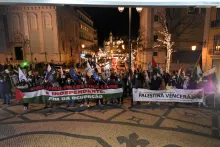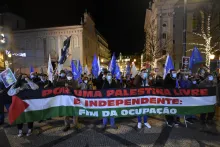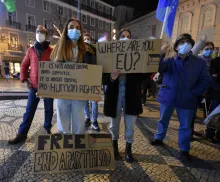Solidarity with Palestine in Lisbon
Answering to an appeal of twenty organizations, with MPPM (Portuguese Movement for the Rights of the Palestinian People and for Peace in the Middle East), CPPC (Portuguese Council for Peace and Cooperation) and CGTP-IN (General Confederation of Portuguese Workers) as the first promoters, hundreds of people gathered in Praça Luís de Camões, in Lisbon, to mark the International Day of Solidarity with the Palestinian People.
Waving flags of Palestine or waving placards demanding the End of the Apartheid Wall, the End of the Occupation, Freedom for Palestinian Prisoners, or the Right to Return of Refugees, the demonstrators shouted their certainty that Palestine Will Win!
There was no lack of an international component, with posters like "Where Are You, EU?", "It Is Not About Being Anti-Semitic, It Is About Being Pro-Human Rights" or "Free Palestine, End Apartheid".
There were interventions from Eduardo Lima, for CPPC, João Coelho, for CGTP-IN, and Carlos Almeida, for MPPM.
This is the text of Carlos Almeida's intervention:
Dear Friends
In 1977, the United Nations General Assembly established November 29 as the International Day of Solidarity with the Palestinian People. In doing so, exactly thirty years after the approval by the same Assembly of Resolution No. 181, which established the plan for an unfair and unjust division of the Palestinian territory into two states, the UN General Assembly assumed that the inalienable rights of the Palestinian people were still unfulfilled and, therefore, the situation in the Eastern Mediterranean remained unstable and a danger to security and peace in the world. It was reaffirmed on that occasion that the full realization of the national rights of the Palestinian people implied, as a necessary and fundamental condition, the right of return and the right to national sovereignty and independence, in harmony with the Charter of the United Nations.
By establishing the need for this International Day of Solidarity, the international community confessed then that it had a historical debt with the people of Palestine, a debt which they bore with unsurpassable dignity and inexhaustible determination. In 1947, a few days after the approval of the partition plan, the Zionist militias started a terror campaign to promote the ethnic cleansing of Palestine, aiming at the conquest of the maximum territory with the minimum population: orchestrated massacres of villages, the planned destruction of hundreds of settlements, intimidation operations that sowed fear and caused the exodus of many hundreds of thousands of people. That same campaign, brutal and insidious, indiscriminate, cold and calculated, is still going on today, happening every day before our eyes.
There was a time when it was possible to hide what was happening to the Palestinian population under the military regime of the occupying power, to silence the pain and the struggle of those who resisted the barbarism, to make invisible the very existence of a people with deep roots in the land that was that of their ancestors, and to sow lies and falsehoods such as the famous refrain of "A Land Without a People for a People Without Land”. Today, this is no longer possible. The reality is there, just a click away.
No one can claim ignorance, no one can say he didn’t know. No one, in fact, with responsibility, can dare to say so.
Because the reports of the Palestinian people's daily struggle and sacrifice and the brutality of the State of Israel reach us every day. It is no longer possible to pretend to be unaware of the continued advance of Zionist colonization in the Palestinian territories occupied in 1967, or to ignore the struggle of Palestinian communities threatened by orders to demolish their homes; no one can say that they are unaware of the settlers' violence against Palestinian farmers who, at this time of year, are engaged in olive harvesting and who so often find their olive trees burned or cut down; no one can pretend not to see the anguish of mothers who say goodbye to their children in the morning, not knowing if they will see them again at the end of the day; no one can pretend not to hear about the children threatened on their way to school and so often taken prisoner; no one can ignore the humiliations at check-points, the night raids, the torture in prisons, the hunger strikes of men and women in administrative detention, without guilt or accusation, without the assistance of a lawyer or the family's knowledge of their whereabouts; no one can claim ignorance of the drama of the Palestinian population of the Gaza Strip, subjected to a cruel and inhumane blockade, nor, even less, the unspeakable violence of the bombings against that population, such as the one that took place in May of this year; no one can say that they are not aware of the precariousness and the dramas faced by the population in the refugee camps, in Palestine, Lebanon or Syria, in Jordan and in the diaspora spread around the world; no one can ignore the discrimination and the segregation regime to which the Palestinians are subjected within the borders of the state of Israel.
For this reason, passivity and lukewarmness are even more disturbing today, ambivalence and equidistance more unacceptable, dissimulation and cowardice more unbearable, empty words more insulting, complicity more reprehensible. Regrettably, successive governments in our country have shown a little of all this. Because if Portugal, a sovereign and independent country, is part of the United Nations system, it also has a share of the responsibility that this International Day of Solidarity with the Palestinian People holds, from the moment it was established. The Constitution of the Portuguese Republic - the matrix document to which all holders of sovereign bodies are bound - clearly and unequivocally states that Portugal is governed "in international relations by the principles of national independence, respect for human rights, the rights of peoples, of equality among states", which "advocates the abolition of imperialism, colonialism and any other forms of aggression, domination and exploitation in relations among peoples" and which "recognizes the right of peoples to self-determination and independence and to development, as well as the right to insurrection against all forms of oppression”.
If this is so, how to explain that Portugal, contrary to the recommendation approved by the Assembly of the Republic[Portuguese Parliament] in 2014, stil does not follow the more than 130 countries that recognize the state of Palestine? That there is no clear, coherent and consistent diplomatic action, oriented towards the defence and promotion of the inalienable rights of the Palestinian people? What justification can there be for the absence of clear, unequivocal, plain words of condemnation of Israel as deserves its repeated practice of defiance of international law, including the hundreds of UN resolutions? What can explain the false equidistance and the artificiality of diplomatic formulas when, last May, bombs were falling on Gaza, indiscriminately victimizing children or journalists, entire families? On what grounds do our country's governments receive in Portugal dignitaries from a state that behaves like an unimputable one? What national interest justifies the deepening of political, commercial, scientific and cultural relations with a state that oppresses, occupies and represses, segregates, humiliates, tortures and kills men and women, elderly and yougsters, in a cold, insensitive and administratively regulated manner?
The decisions we have to make about our collective life, the ones we will soon be called upon to make as a political community, are also related to the country we want to be, to the place we want Portugal to occupy on the international scene, observant of international law or alongside those who systematically violate it, sovereign in its decisions or submissive to blackmail and subservient to the powers that be, firm and coherent heirs of the liberating legacy of the 25th of April, against fascism and colonialism, or, on the contrary, servants of old and not very new forms of domination and exploitation? To the holders of the sovereign bodies, the current ones and to those who may be elected, we wish to say, those of us who are here, those who are accompanying us in the concentration that is taking place in Oporto, those who cannot be here and those who agree with these principles, that, active and vigilant, we will continue to demand from them the political commitment to which they are obliged by constitutional imperative in favour of the Palestinian people and its struggle.
We, who make solidarity a daily practice, have gathered here, today and always, to bear public witness to our admiration and deep respect for the heroic and secular gest of the Palestinian people. Those of us who do not traffic in principles for circumstantial and deceitful conveniences, those of us who do not give in to blackmail, those of us who do not vacillate in the face of the conditioning of opinion, we take sides, we choose with conviction the place where we are, where we want to be, which is always the place of the oppressed. We, who consider inviolable the right of each people to choose the paths of their struggle, reaffirm our solidarity with the resistance of the Palestinian people in all its forms. We, who understand democracy as a daily exercise of social intervention, guided by the values of freedom, friendship and cooperation among peoples, want to reiterate our firm commitment to strengthen and expand the movement of solidarity with the cause of the Palestinian people.
From this platform we would like to greet the organizations that shared with us the convocation of this act of solidarity, the General Confederation of Portuguese Workers - National Trades Union and the Portuguese Council for Peace and Cooperation. We extend this greeting to all organizations and collectives who contributed to its divulgation, to all friends who joined in this act, symbolic but profound in meaning, to all who throughout the country give their contribution to the clarification, the denunciation of the crimes of occupation, the divulging of the struggle of the Palestinian people, its history, its art and its culture. And we call for closer ties and the strengthening of convergences to strengthen the movement of opinion in solidarity with the Palestinian people, a movement that broadens civic consciousness and is able to impose a consistent policy oriented to the defence and promotion of the Palestinian national cause.
Let us raise high the Palestinian flag! Let the wind carry the voice of solidarity from the Portugal of April [April 25th, 1974 – the revolution that ended the fascist regime] to the prisons of Israel, to the refugee camps, to the neighbourhoods of Gaza, to the alleys of Jerusalem and Hebron, to the camps and universities of Palestine. May there be heard the cry that we launch from here: Palestine Will Win!

